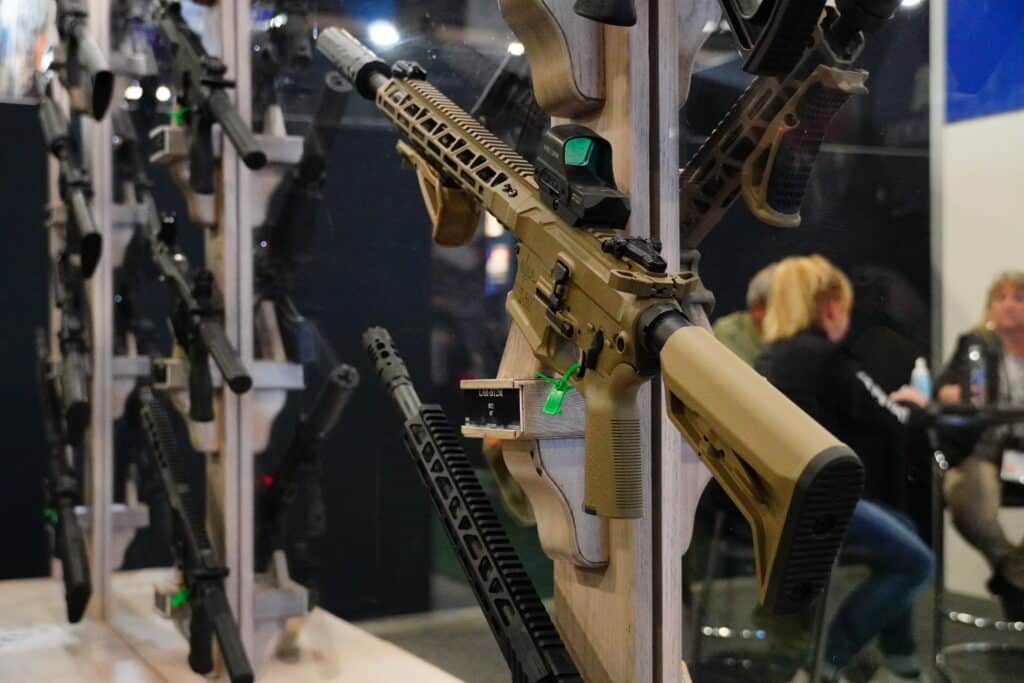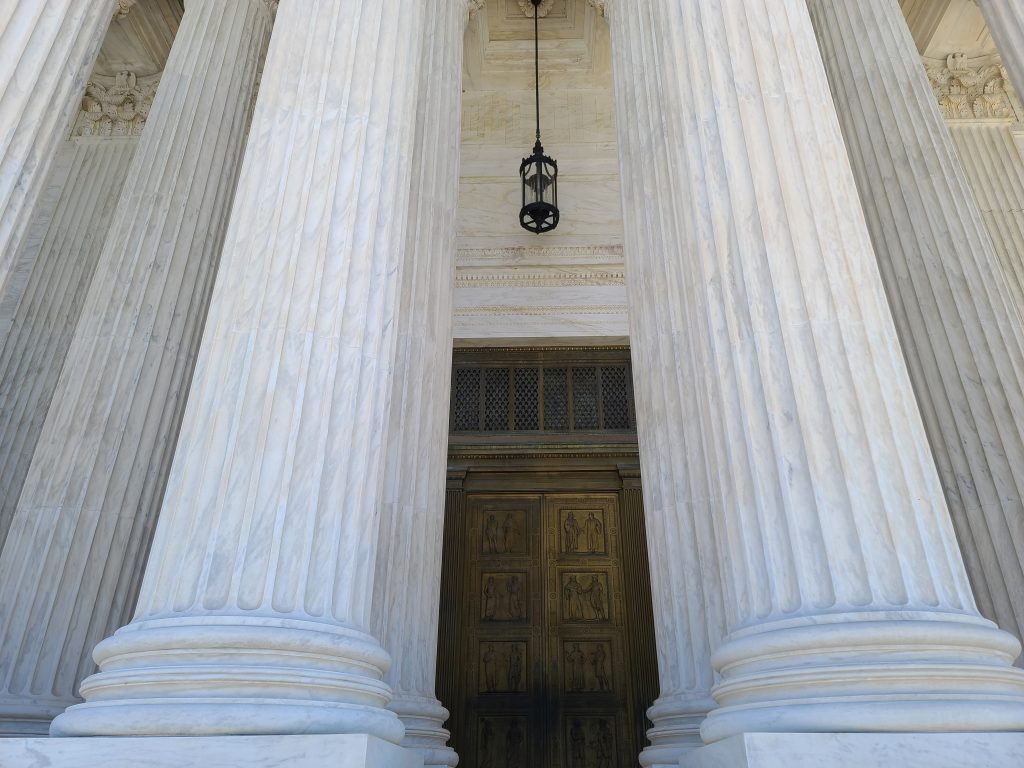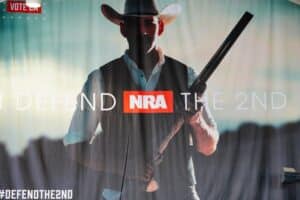Colorado has moved one significant step closer to banning the sale of “assault weapons,” which includes but isn’t limited to AR-15s. A bill to do so cleared its first significant hurdle this week.
As Contributing Writer Jake Fogleman has written about before, an AR ban in a more conservative federal court’s jurisdiction could eventually produce a circuit split that incentivizes the Supreme Court to take up the issue. But, as he explains in today’s piece, the future of the proposed Colorado ban is far from certain.
Plus, while there has been a lot of bad news at the NRA in recent months and years (including even this week), the nation’s largest gun-rights group just got some good news. Its First Amendment suit against a former New York regulator seemed to fair well in oral arguments at the Supreme Court on Monday. I have a piece examining what each justice said, and we have a First Amendment expert from FIRE on the podcast to review the case as well.

Analysis: Will Colorado Ban ‘Assault Weapons’ This Year? [Member Exclusive]
By Jake Fogleman
Gun-control advocates in the Centennial State hit a new milestone this week by getting an “assault weapon” ban passed out of a House committee. Whether that momentum will translate into law, however, remains quite murky.
On a 7-3 party-line vote, House Democrats advanced HB24-1292 out of the Judiciary Committee and onto the floor early Wednesday morning after a marathon hearing that lasted more than 14 hours and saw more than 600 people testify on the bill.
That marked the first time a sales ban on AR-15s and other semi-automatic firearms has ever passed out of a committee in Colorado’s history. It is also a quick reversal of fortune for AR-15 ban supporters since a similar measure died just last year in the same committee when multiple Democrats crossed over to vote against it alongside Republicans.
With the wind at their backs and near supermajority control of the state legislature, on paper, Colorado Democrats appear to have their best opportunity yet to make the state the eleventh in the nation to adopt a ban on sales of popular guns. But significant hurdles remain.
Here’s a look at the road ahead for supporters of the gun ban effort.
Colorado House
The state House offers the best venue for the ban bill’s continued success. Democrats control the chamber 46-19, and it is considered the more progressive body of the Colorado General Assembly.
Additionally, House Democrats have maneuvered to give the bill the best possible odds of success on its journey out of the chamber. House leadership shuffled the makeup of the Judiciary Committee heading into this legislative session, removing all but one of the House Democrats who voted against last year’s effort.
House Bill 1292’s sponsors also voluntarily amended the bill during its first hearing Tuesday to help fast-track it to the supermajority-controlled House floor. As initially introduced, the bill contained civil penalties of up to $500,000 for violators rather than criminal penalties. That would have forced the bill to make a stop in the House Finance committee before it could receive a floor vote. That’s important because it is a much more narrowly Democratic-controlled committee, and it also just so happens to feature two of the Democrats who helped sink last year’s ban effort.
Instead, they amended the bill to include criminal penalties of up to ten days in jail for violators of the weapons ban, allowing it to go directly to a body where supporters can afford to lose a few moderate-district “no” votes. Once brought up, it’s difficult to see the measure failing to pass out of the House.
Colorado Senate
In contrast, the state Senate is the most significant near-term roadblock for proponents of the ban.
While it is still safely in Democratic hands by a 23-12 margin, its members are considered more moderate. They may be less eager to take up something as controversial as an outright ban on the sale of popular firearms. Notably, the House-led bill still lacks a single Senate co-sponsor, though the Denver Post has reported that some senators have expressed interest in signing on.
Even if a Senator does come forward to add their name to the measure, getting it out of committee will be another story. That’s because its likely first stop would be the Senate Judiciary Committee, where Democrats only hold a one-member advantage. With Republicans unanimously opposing the proposal, the defection of a single Democratic committee member would be enough to sink the bill yet again.
Furthermore, the committee’s Vice Chair, Dylan Roberts (D.), represents part of Colorado’s more rural Western Slope and has shown a willingness to buck some of his party’s gun-control efforts in the past. He voted against last year’s measure to raise the minimum age to buy firearms in the state as well as the state’s new law allowing citizens to sue gun businesses for third-party criminality. While he has not yet given a definitive position on the assault weapon ban, it is safe to say that getting his support on the bill will not be a slam dunk.
Governor’s Office
Colorado Governor Jared Polis (D.) is the final hurdle for supporters of the ban, and he represents something of a wildcard on the issue. His office didn’t respond to a request for comment on whether he’d sign such a ban, and he has a mixed record on the issue.
While there is some indication that he is against the current effort to ban broad categories of commonly owned firearms, he has not publicly taken a definitive stance either way. As a member of Congress representing Boulder in 2013, Polis took a firm stance against such bans.
“I believe it would make it harder for Colorado families to defend themselves and also interfere with the recreational use of guns by law-abiding Coloradans,” Polis told The Denver Post at the time. “If we want to reduce violence, we should invest in improving our schools to ensure that young people have jobs and do not turn to gangs, crime or violence of any form, and improving access to mental health services.”
Just five years later, however, he signed on to a renewed U.S. House ban proposal as a co-sponsor shortly after the Parkland shooting.
“As our communities have experienced more and more mass shootings, we cannot ignore the fact that assault weapons are a common theme in almost all of them,” Polis told The Post.
During his initial run for Governor later that year, he again attempted to carve out a moderate lane on the gun issue compared with his Democratic primary opponents. And throughout his tenure in the Governor’s office since then, he has never advocated for a ban, even as he has been willing to sign roughly a dozen other gun-control measures into law.
In recent months, he has largely deflected from saying what he would do if a ban reached his desk while simultaneously questioning the wisdom of using political capital to pursue one in light of the Supreme Court’s 2022 Bruen decision.
“We have not yet even succeeded in being able to raise the age limit to (purchase guns in Colorado to) 21,” he told The Colorado Sun last fall, referring to a federal court decision blocking the state’s under-21 gun ban, when asked about the possibility of an assault weapon ban.
None of that means a ban is impossible. Given the state’s balance of power and the way that assault weapon bans have become Democratic-party orthodoxy in recent years, that could be enough for progressives to continue building support for the bill to get it across the finish line.
On the other hand, the more moderate Democrats do not have the same appetite for the issue that gun-control advocates and their safe-district counterparts do. Despite the state’s blue-trending political trajectory, that could be enough to doom the ban.
Podcast: FIRE’s First Amendment Scholar on the NRA’s Supreme Court Case [Member Early Access]
By Stephen Gutowski
This week, we’re looking at another Supreme Court case. This one involves the National Rifle Association, but not the Second Amendment. Instead, NRA v. Vullo is a First Amendment claim.
On Monday, the High Court held oral arguments in the case. So, we’ve got FIRE’s Bob Corn-Revere on the show to discuss how those went. He filed a brief in support of the NRA on behalf of the group. But he also has a long history in First Amendment litigation, including at the Supreme Court.
He explained the basics of the case. Then he walked through why he believes former New York financial regulator Maria Vullo’s efforts to get insurance companies to drop the NRA over its “gun promotion” activities ran afoul of the group’s free speech rights. He also reacted to the questions each justice asked during arguments and gave some insight into what they tell us about how the Court is leaning.
Plus, Contributing Writer Jake Fogleman and I talk about a report that shows the Maine shooter could have and should have been disarmed.
You can listen to the show on your favorite podcasting app or by clicking here. Video of the episode is available on our YouTube channel. An auto-generated transcript of the show is available here. Reload Members get access to the show on Sunday, as always. Everyone else can listen on Monday.

Analysis: SCOTUS Oral Arguments Bode Well For NRA First Amendment Claim [Member Exclusive]
By Stephen Gutowski
The National Rifle Association may soon achieve its first significant win in quite a while.
This week, the Supreme Court heard oral arguments in the struggling gun-rights behemoth’s First Amendment case against a former New York financial regulator. While predicting the outcome of a case based solely on what happens in arguments is perilous, the questions asked by the justices can provide some insight into how they feel about the case. In NRA v. Vullo, a sizable majority of the Court seemed on board with the idea the gun group’s rights were abused.
Let’s start with the most vocal justices.
Those would be Justice Samuel Alito and Justice Kentaji Brown Jackson. Perhaps unsurprisingly, their questions tended to be aimed in opposite directions.
Alito focused much of his time on the line between government persuasion and coercion. He not only seemed to believe that Maria Vullo’s attempt to convince insurance companies to cut off business with the NRA over its “gun promotion” effort was a violation of the First Amendment but a pretty overwrought one at that.
“They gilded the lily or whatever the phrase is,” he said at one point. “I mean, they were ham-handed about this. The people up in New York are rubes. They don’t really understand how to do this.”
The thrust of most of his questioning was not whether Vullo’s letter warning the companies about the “reputational risk” of working with the NRA or her alleged February 18th, 2018 meeting with a Lloyds of London executive telling them she’d go easier on the company’s infractions if they dropped the gun group were coercive, but whether a more “sophisticated” approach would also violate the First Amendment. He was highly skeptical the guidance letter Vullo sent warning insurers about the NRA’s politics weren’t clear threats on their own.
“I mean, seriously, you think that sophisticated insurance companies are not taking into account adverse risks?” he asked Vullo’s lawyer. “They probably had heard about the Parkland shooting and the aftermath of it. You think they hadn’t already taken this into account, and didn’t they already know all the power that Ms. Vullo had over them?”
In contrast, Justice Jackson was more focused on the idea that Vullo’s actions stemmed primarily from a legitimate violation of the law by the NRA and its insurers. She was concerned that an overly broad application of the NRA’s defense could effectively make it impossible to regulate the conduct of advocacy groups.
“What I’m worried about is your position ultimately reducing to anytime a regulator enforces the law against an entity that does business with an advocacy organization, we have a First Amendment violation,” she said. “Because it seemed like your answer to him was, well, what gets this into the First Amendment column, unlike other scenarios, is that the NRA advocates for guns, and it’s an
advocacy organization, and so action taken against it makes it a First Amendment violation.”
Justice Elana Kagan brought up a similar concern about Vullo’s warnings over the “reputational risk” of working with the NRA.
“But that idea of reputational risk, Mr. Cole, that is a real idea, right? It wasn’t invented for the NRA,” she said. “There is a view that bank regulators have that companies are supposed to look at their reputational risks. It might be that gun advocacy groups, gun companies do impose reputational risks of the kind that bank regulators are concerned about.”
Justice Sonya Sotomayor also questioned the idea that the consent decrees the insurance companies signed agreeing to end all business with the NRA were a problem in and of themselves.
“I’m not sure the consent decrees could be viewed as selective prosecution when there is no question, I don’t believe that the Carry Guard insurance policies had provisions that violated New York law,” she said. “They reimbursed for criminal activity, and they reimbursed for intentional acts, which New York insurance law clearly says you can’t do.”
Still, all three liberal justices expressed concerns with Vullo’s actions.
While Sotomayor noted some parts of the insurance offered by the NRA and its partners were illegal, she questioned why Vullo forced them to stop doing business with the NRA altogether nationwide.
“These affinity programs could have been altered,” she said. “And these consent decrees and what she was seeking was a ban, even of potentially lawful affinity programs. I mean, if they had taken out the intentionality provision or the criminal activity provision and just insured for accidents with guns or things like that, those would have been lawful. She went further…”
Kagan implied that Vullo’s February 18th meeting with Lloyds was an easier case to make as a First Amendment violation than the letters she sent.
“I put the Lloyd’s meeting in a different category and was really more interested in I think that this is a closer one just because if reputational risk is a real thing,” she said of Vullo’s reputation risk warning, “and if gun companies or gun advocacy groups impose that kind of reputational risk, isn’t it a bank regulator’s job to point that out?”
Similarly, Justice Jackson questioned whether the situation fits the precedent established in Bantam Books v. Sullivan because Vullo was pressuring insurance companies rather than bookstores or other speech-based businesses. However, she was more sympathetic to the idea what Vullo did might constitute retaliation based on the NRA’s speech.
“Justice Gorsuch suggests that you might have a retaliation claim, which is a kind of First Amendment, it’s a species of First Amendment,” she said. “You allege it in this case. And that makes perfect sense, right, that they’re — they’re punishing me because of my speech. That’s retaliation.”
Speaking of Justice Neil Gorsuch, he questioned the government’s insistence that the first four paragraphs of Vullo’s guidance letter would have been acceptable. The government agreed Vullo’s February 18th meeting crossed the line but tried to argue most of the guidance letter didn’t because it was persuasion rather than coercion. However, Gorsuch noted that the letter didn’t end after four paragraphs and included an implicit threat of government action.
“You agree, though, the fifth paragraph changes the calculus?” Gorsuch said.
Justice Brett Kavanaugh shared Jackson’s note that Bantam was more straightforward because the third party being pressured was directly involved in distributing somebody else’s speech. He said that made the case “a bit unusual” but concluded the distinction didn’t matter.
“I take your point that Bantam Books, as long as the ultimate action is against speech, it doesn’t matter that the intermediary is not itself a speech business,” he told the NRA’s lawyer.
He seemed to take the government’s opposition to Vullo as a significant marker in the case, too.
“Mr. Katyal, it’s a bit jarring, I guess, for me that the Solicitor General is on the other side from you in this case, given that the Solicitor General represents the United States, and as we know from the last case, has a strong interest in not expanding Bantam Books,” Kavanaugh told Vullo’s lawyer. “So how should we think about that?”
There were fewer clues about how the other conservative justices were leaning when they questioned the lawyers in the case. Justice Amy Coney Barrett asked primarily about procedural issues with the case. Justice Clarence Thomas only asked four questions, though one seemed skeptical of the idea that Vullo’s actions were in response purely to the NRA’s actions rather than its beliefs.
“Would you spend just a small amount of time explaining why you think the conduct, all of this is infected by, I guess, the one illegal insurance product involved here?” Thomas asked.
The only question Chief Justice John Roberts that might provide some insight into his thinking dealt with, again, the idea that Vullo’s actions could be justified because of the underlying issues with the NRA’s insurance policies.
“You’re not suggesting that if, for example, after the initial conduct by Ms. Vullo and the reaction of the National Rifle Association, if she instructed her staff to go through these policies and find something, you know, that violates some regulation in there, that she could then defend against — the basis of terminating all that, on the basis of those newly discovered violations?” he asked Vullo’s lawyer.
Another common thread that several justices touched on that could give reason to think the NRA stands to win the case stems from the stage the case is in. The justices won’t be deciding the case on the merits of the underlying claims. Instead, the Supreme Court is merely deciding whether to dismiss the claims without further litigating the allegations.
So, the standard for review is much lower. As Justice Alito pointed out, all the NRA has to do is show there is a plausible First Amendment claim. And that’s with the assumption the events at issue happened the way the NRA alleges.
“Mr. Katyal, you’re shifting the burden to them,” Justice Alito said. “This is a First Amendment case. All they need to do is to show that the desire to suppress speech was a motivating factor.”
That’s it for now.
I’ll talk to you all again soon.
Thanks,
Stephen Gutowski
Founder
The Reload







